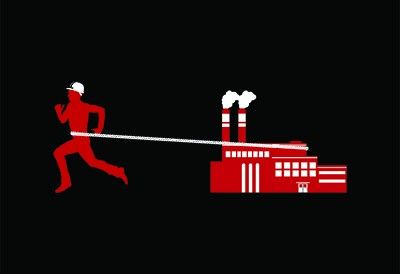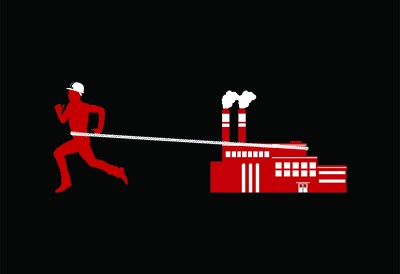
Frontline Fundamentals: HP Principle Three: You Cannot Outperform Your Organization

What happens to a saltwater fish if we put it in fresh water? No matter what that fish does, no matter how well it can swim, no matter how strong it is and no matter how hard it tries, it cannot survive because we put it in the wrong environment.
When it comes to human performance, HP principle three states that individual behavior is influenced by organizational processes and values. It implies that incident causation goes deeper than individuals, and that to prevent incidents, organizational (systems) deficiencies must be identified and corrected. The challenge for an organization is to create an environment in which employees – the organization’s greatest asset – perform at their highest level. You do not want to create an environment in which latent organizational weaknesses set employees up for failure.
Us vs. Them
Imagine a group called Us and a group called Them. Them has a package labeled Profit that needs to get from Point A to Point B on or before a day called Standard. Them creates directions on how to get from Point A to Point B, which are contained in the Map. Them gives the Map to Us and instructs Us to go to Point A, pick up Profit and deliver it to Point B on or before Standard.
Us arrives at Point B two days late with only part of Profit because Us got lost. Them is furious and blames Us for losing part of Profit by not arriving at Point B on Standard. Us blames Them, complaining that the Map was wrong, which caused Us to get lost and be late. Two weeks later, this scenario is repeated, with more of Us losing part of Them’s Profit, so Them sends Middle Man to investigate and determine corrective action.
Middle Man forms an investigative group that consists of people named Assumption, Blame and Inconsistency. Assumption says Us had directions and knew that Profit had to get to Point B on or before Standard. Blame agrees that Us is at fault, and Inconsistency cannot believe two separate groups from Us made the same mistake. Together, they recommend that Middle Man tell Them they should no longer work with Us.
I hope you were able to follow all of that, and more so, I hope that scenario didn’t sound familiar – but I’m guessing it might have. Let’s clarify a few things that I hope you will consider in the future:
- Them is not evil and wanted Us to succeed.
- Them was not aware the Map was incorrect.
- Us wanted to meet the Standard and deliver all the Profit.
- Us was capable of meeting the Standard and delivering all the Profit, even with the incorrect Map.
- Us had information Them needed about the Map but did not share it because Us does not trust Them.
- Them had information Us needed about the correct directions but did not share it because Them assumed they were right. Us did not ask any questions. Them did not involve Us in the planning process.
- No one monitored Us along the path from Point A to Point B.
- Middle Man focused on assigning blame based on Results. He should have been working to prevent recurrence by looking at Performance. Performance includes Behavior (Us followed the Map) and Results (loss of Profit and not meeting the Standard).
Forming a Team
We could go on and on trying to assign blame and figure out who should have done what and never be successful. So, two things must happen. First, to avoid recurrence of this specific issue, the Map has to be corrected, and Us and Them have to stop blaming, complaining and making excuses and instead take responsibility. Second, similar issues will arise and be repeated until Us and Them form a team with effective leadership working toward a common vision, mission and goals. There can be no Us and there can be no Them, there can only be Team.
It is critical for individuals and organizations to align themselves and work together, not against each other. When Us and Them form a Team that has a correct Map, it becomes easy and repeatable to get Profit from Point A to Point B and meet the Standard. To quote Phil Jackson, who won quite a few NBA titles, “The strength of the team is each individual member. The strength of each member is the team.”
Systems Thinking
Focusing on correcting one employee or one group of employees can improve that employee or that group, but at best you will garner compliance. Focusing on improving systems and correcting latent organizational weaknesses has the potential to improve every employee and every group at your organization, and it’s likely that you will garner compliance plus discretionary effort. All it takes is organizational humility, situational awareness, openness to feedback and willingness to improve.
Conclusion
Leadership expert John Maxwell was correct when he said that “people rise or fall to meet your level of expectations for them.” So was the Greek poet Archilochus, who said that “we don’t rise to the level of our expectations, we fall to the level of our training.” Individual behavior is influenced by organizational processes and values. Furthermore, individuals and organizations cannot outperform each other.
We started with a saltwater fish in fresh water and we will end with this: It’s not the fish that matters and it’s not the water that matters – what matters is having the right fish in the right water.
About the Author: David McPeak, CUSP, CET, CHST, CSP, CSSM, is the director of professional development for Utility Business Media’s Incident Prevention Institute (www.ip-institute.com). His experience includes operations management, safety and training roles. McPeak holds multiple safety and training certifications and has received numerous awards. He also has served as chairman of Task Team One of the OSHA ET&D Partnership, as a member of Incident Prevention’s editorial advisory board and as a member of the North Carolina Apprenticeship Council. Reach him at david@utilitybusinessmedia.com.
About Frontline: The Frontline program provides interactive, engaging classroom training that empowers employees to become better utility safety leaders. Subject matter experts facilitate the learning process and cover four areas – safety leadership, incident prevention, human performance, and standards and operations – critical to safety success. Visit www.frontlineutilityleader.com for more information.
*****
Webinar on HP Principle Three: You Cannot Outperform Your Organization
July 11 at 3 p.m. Eastern
Visit www.frontlineutilityleader.com for more information.

